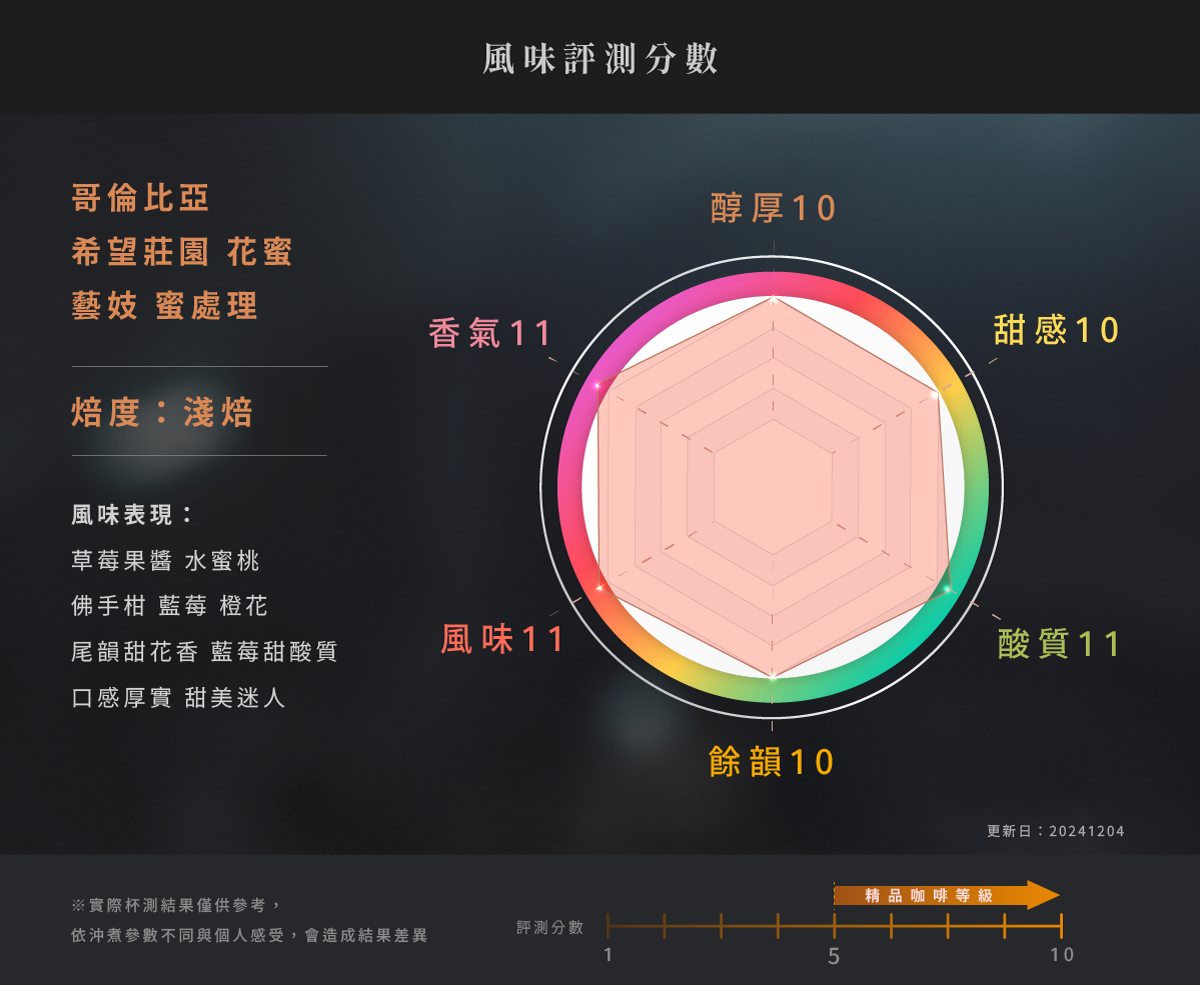

Colombia Cafe Granja La Esperanza 100% Geisha Kamitsu Honey







Coffee Flavor
The flavors of coffee are derived from the breakdown of various nutrients in the green coffee beans during roasting. Heat causes these compounds to degrade into a variety of aromatic molecular structures, resulting in a wide spectrum of flavors. High-quality coffee beans naturally possess a rich aroma that evolves at different temperatures—high, medium, and low—offering a delightful and nuanced experience worth savoring.
Colombia Cafe Granja La Esperanza 100% Geisha Kamitsu Honey
Strawberry jam, peach, bergamot, blueberry, orange blossom; sweet floral finish, blueberry-like sweet acidity, full-bodied, and delightfully sweet.

Kamitsu, meaning "nectar" in Japanese, is a masterful interpretation of natural sweetness translated into coffee flavor. Crafted by Colombia’s top-tier Cafe Granja La Esperanza, this product serves as a continuation of their washed-process Geisha "Hanami" while showcasing the unique charm of the honey process.
Unlike the refreshing and delicate floral elegance of washed Hanami, Kamitsu focuses on the essence of the honey process. Each cup emanates a syrup-like delicacy, accompanied by a velvety smooth texture, transporting you into a dreamlike tasting experience. It strives to capture the original intent and essence of the honey process, delivering flavors that deeply resonate with the soul.
Kamitsu is a perfect harmony of the refined elegance of the Geisha variety and the intrinsic beauty of honey processing, offering an unforgettable coffee experience that lingers with every sip.

Once named one of the "World's Top 10 Most Expensive Coffees" by Forbes, Geisha coffee has become a legendary name in the world of specialty coffee. However, the term "Geisha" is often a source of confusion due to the existence of multiple genetically distinct plant types sharing the name. Many of these plants trace their geographical origins to Ethiopia. Recent genetic diversity analyses by the World Coffee Research Center confirmed that the T2722 variety grown in Panama is both unique and consistent. When well-managed in high-altitude regions, it has a strong correlation with exceptional cup quality, renowned for its refined floral aromas, jasmine notes, and peach-like fragrance.
The Geisha coffee grown in Panama for over 60 years belongs to the T2722 variety, originally collected in the 1930s from Ethiopia’s coffee forests. It was sent to the Lyamungu Research Station in Tanzania before being introduced to Central America in 1953 via the Centro Agronómico Tropical de Investigación y Enseñanza (CATIE) in Costa Rica, where it was cataloged as T2722.
In the 1960s, its resistance to coffee leaf rust was recognized, leading to its distribution across Panama through CATIE. However, due to its fragile branches, farmers were reluctant to cultivate it widely. This changed in 2005, when the Peterson family from Boquete, Panama, entered Geisha coffee into the Best of Panama (BOP) competition and auction. The coffee received outstanding evaluations, broke auction price records for green coffee at the time, and catapulted Geisha into international fame.
The names "Geisha" and "Gesha" are often used interchangeably, reflecting transliteration differences from Ethiopian dialects to English. The coffee was initially recorded as "Geisha" in early cultivation records, and this spelling became widely used in coffee research and industry databases. However, the coffee was originally collected from a mountain in Ethiopia, where the name is more commonly transliterated as "Gesha" or "Geisha" in English.
In recent years, Geisha has gained worldwide popularity, with successful cultivation across various regions, including Guatemala, Costa Rica, El Salvador, Colombia, Peru, and other parts of Central and South America. These plantations primarily grow the T2722 variety introduced from Panama. Additionally, Taiwan's high-altitude regions have embraced Geisha cultivation. The higher the altitude, the more enchanting the flavors, making Geisha coffee a true gem of the coffee world.

(Coffee Processes)
Coffee processing refers to the transformation of ripe red coffee cherries into dried green coffee beans. Each method has its pros and cons, influenced by the natural environment and specific needs of the production region. Therefore, each coffee-producing area adopts processing methods best suited to its conditions. This batch uses either the Natural Process or the Washed Process, which are summarized below:
Honey / Pulped Natural / Semi-dry Process
The honey process is a method that combines elements of both the natural process and the washed process. This technique was initially developed in Costa Rica. Similar to the washed process, the skin and pulp of the coffee cherries are removed, but the fermentation step is skipped. Instead, the mucilage layer (a sticky, sugary layer around the bean) is left intact and dried under sunlight.
The term "honey" does not refer to the addition of actual honey. Rather, it derives from the sticky texture of the mucilage, which resembles honey. The retention of this layer, rich in sugars and acids, is the key to the honey process. The amount of mucilage left on the beans determines the sweetness and flavor complexity:





JUSTIN INTERNATIONAL FOOD ENTERPRISE CO., LTD.
Tel: +886-3-358-6611
1st Floor, No. 30, Lane 120, Daxing Road, Taoyuan District, Taoyuan City
▶This product is covered by a NT$10 million product liability insurance.
▶Food Industry Registration Number: F-165601955-00000-0
▶ Our company’s cupper is certified as a CQI International Coffee Quality Appraiser.



Recommended Products


※ 詳細出貨及付款說明、發票、海外訂購須知...等,請 點擊進入